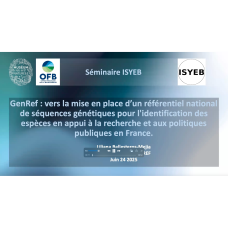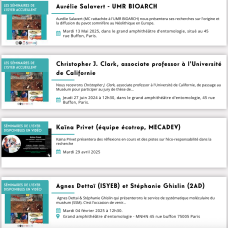Eric Bapteste, DR CNRS, co-responsable de l’équipe (AIRE) de l’ISYEB


Les séminaires de l’ISYEB accueilleront Eric Bapteste, DR CNRS, co-responsable de l’équipe Adaptation, Intégration, Réticulation, Evolution (AIRE) de l’ISYEB qui présentera ses travaux
Evolutionary biologists have observed that ageing is flexible across the Web of Life, questioning the ultimate and proximate causes of why, how and when organisms age. Genes associated with ageing and molecular networks associated with ageing have been characterized in some species, consistently with mainstream evolutionary theories of ageing. However, many challenges lie ahead to enhance our understanding of the evolution of ageing. In this talk, I will briefly introduce methods to analyze the architecture and the dynamics of molecular networks associated with ageing, to assess their evolutionary conservation across species, and suggest some evidence that molecular networks associated with ageing in a given host organism may be affected by ‘age-distorters’, which, beyond classic evolutionary studies of ageing, encourages the development of original co-evolutionary analyses of ageing.
Teulière J, Bernard C, Bonnefous H, Martens J, Lopez P, Bapteste E. Interactomics: dozens of viruses, co-evolving with humans, including the Influenza-A virus, may actively distort human ageing. Mol Biol Evol. 2023. doi: 10.1093/molbev/msad012
Teulière J, Bernard C, Corel E, Lapointe FJ, Martens J, Lopez P, Bapteste E. Network Analyses Unveil Ageing-associated Pathways Evolutionarily Conserved from Fungi to Animals. Geroscience. 2022 Dec 12. doi: 10.1007/s11357-022-00704-2
Bernard G, Teuliere J, Lopez P, Corel E, Lapointe FJ, Bapteste E: Aging at Evolutionary Crossroads: Longitudinal Gene Co-expression Network Analyses of Proximal and Ultimate Causes of Aging in Bats. Mol Biol Evol. 2022;39(1). https://doi.org/10.1093/molbev/msab302
Teulière J, Bernard C, Bapteste E: Interspecific interactions that affect ageing: age-distorters manipulate host ageing to their own evolutionary benefits. Ageing Res Rev. 2021 May 31:101375. doi: 10.1016/j.arr.2021.101375
Supergenes – large non-recombining genomic regions – control compound adaptive phenotypes, such as alternative colony social organization in ants. Supergenes typically link co-adapted loci but are also prone to accumulate recessive deleterious mutations



